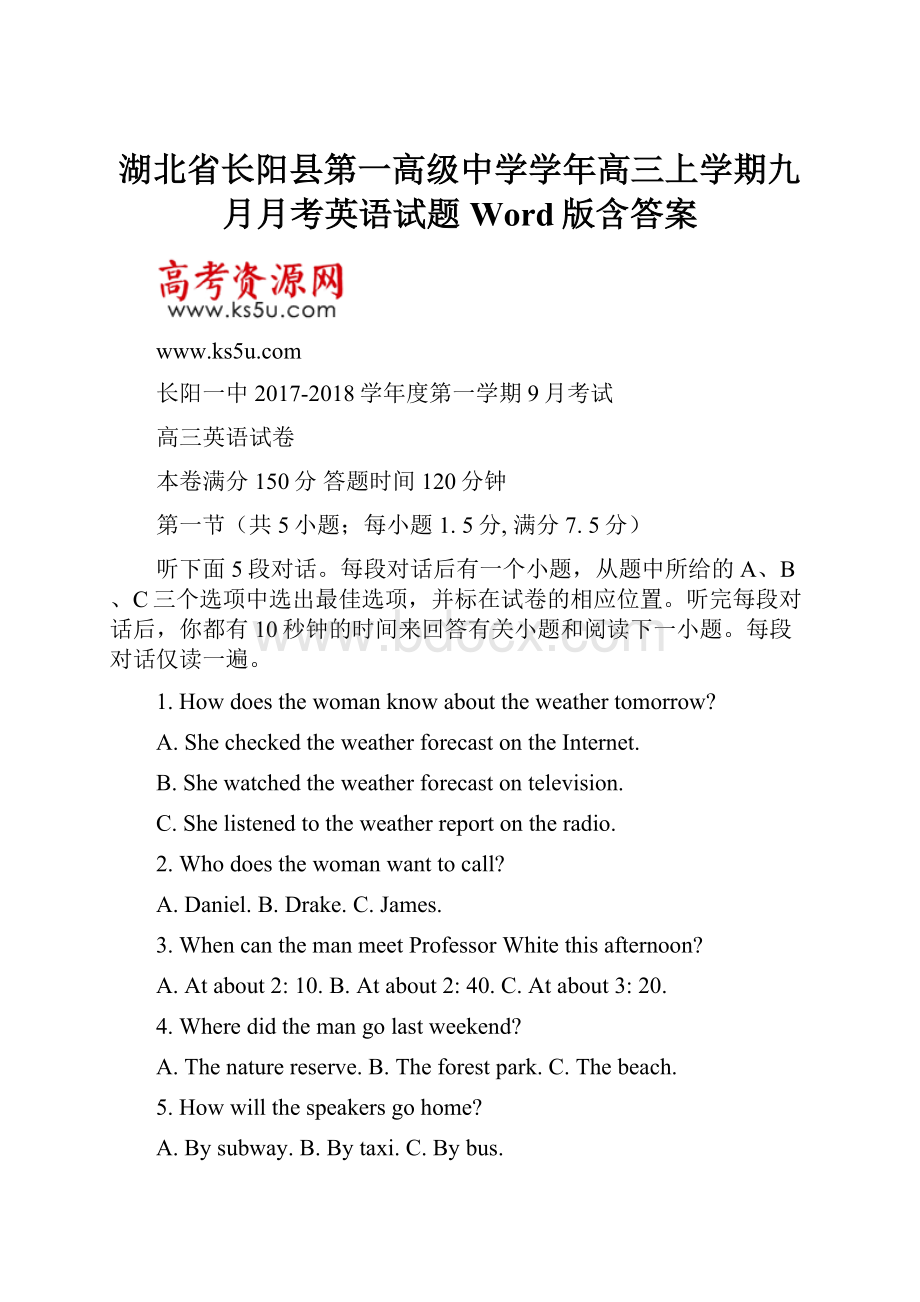湖北省长阳县第一高级中学学年高三上学期九月月考英语试题 Word版含答案.docx
《湖北省长阳县第一高级中学学年高三上学期九月月考英语试题 Word版含答案.docx》由会员分享,可在线阅读,更多相关《湖北省长阳县第一高级中学学年高三上学期九月月考英语试题 Word版含答案.docx(16页珍藏版)》请在冰豆网上搜索。

湖北省长阳县第一高级中学学年高三上学期九月月考英语试题Word版含答案
长阳一中2017-2018学年度第一学期9月考试
高三英语试卷
本卷满分150分答题时间120分钟
第一节(共5小题;每小题1.5分,满分7.5分)
听下面5段对话。
每段对话后有一个小题,从题中所给的A、B、C三个选项中选出最佳选项,并标在试卷的相应位置。
听完每段对话后,你都有10秒钟的时间来回答有关小题和阅读下一小题。
每段对话仅读一遍。
1.Howdoesthewomanknowabouttheweathertomorrow?
A.ShecheckedtheweatherforecastontheInternet.
B.Shewatchedtheweatherforecastontelevision.
C.Shelistenedtotheweatherreportontheradio.
2.Whodoesthewomanwanttocall?
A.Daniel.B.Drake.C.James.
3.WhencanthemanmeetProfessorWhitethisafternoon?
A.Atabout2:
10.B.Atabout2:
40.C.Atabout3:
20.
4.Wheredidthemangolastweekend?
A.Thenaturereserve.B.Theforestpark.C.Thebeach.
5.Howwillthespeakersgohome?
A.Bysubway.B.Bytaxi.C.Bybus.
第二节(共15小题;每小题1.5分,满分22.5分)
听下面5段对话或独白.每段对话或独白后有几个小题,从题中所给的A、B、C三个选项中选出最佳选项。
并标在试卷的相应位置。
听每段对话或独白前,你将有时间阅读各个小题,每小题5秒钟;听完后,各小题将给出5秒钟的作答时间。
每段对话或独白读两遍。
听第6段材料,回答第6、7题。
6.Whatistheman’soccupation?
A.Adoctor.B.Apoliceman.C.Afirefighter.
7.Whichofthefollowingsubjectsismentionedinthedialogue?
A.Physics.B.Geography.C.Architecture.
听第7段材料,回答第8、9题。
8.Whenwilltheplanetakeoff?
A.Beforenoon.B.Intheafternoon.C.Intheevening.
9.WhatwillMrs.Joneshave?
A.Coffee.B.Cakes.C.Breakfast.
听第8段材料,回答第10至12题。
10.Whatdoesthemanconsiderfirstwhenchoosingasuitcase?
A.Itsbrandandmaterial.B.Itssizeandstyle.C.Itspriceandcolor.
11.Whydoesthewomanrecommendthewallet?
A.Becauseit’sonsalethesedays.
B.Becauseit’smadeofrealleather.
C.Becauseit’spopularandcanbefolded.
12.Howmuchwillthemanpayforwhathehasboughtintotal?
A.580yuan.B.620yuan.C.700yuan.
听第9段材料,回答第13至16题。
13.WhatdoesNPRreferto?
A.ATVstation.B.Anewspaper.C.Aradiostation.
14.Wheredoesthemanmostlygetthenewsfrom?
A.Theradioorthenewspaper.B.TheradioortheInternet.
C.TheInternetorthenewspaper.
15.Whichnewsisthemanmostinterestedin?
A.Sportsandeconomicnews.B.Scientificandeducationalnews.
C.Entertainmentandsocialnews.
16.WhereisCareynow?
A.InBritain.B.InJapan.C.InAmerica.
听第10段材料,回答第17至20题。
17.WhenwastheHopeDiamonddiscoveredinIndia?
A.Inthe16thcentury.B.Inthe17thcentury.C.Inthe18thcentury.
18.WhoboughttheHopeDiamondin1911?
A.ArichAmericanwoman.B.AmancalledHenryPhillipHope.
C.AwealthybusinessmanfromFrance.
19.HowistheHopeDiamondbeingshowninthemuseum?
A.Withoutitsusualsetting.B.Onalongdiamondchain.
C.Among16smalldiamonds.
20.WhydoesthemuseumshowtheHopeDiamond?
A.Totrytosellittosomeone.B.Toletsomeexpertstoassessitsvalue.
C.Tomarkitsfiftiethanniversaryinthemuseum.
第二部分阅读理解(共两节,满分40分)
第一节(共15小题;每小题两分,满分30分)
阅读下列短文,从每题所给的四个选项(A、B、C、D)中,选出最佳选项。
A
Atenderwoman,oranindependentone,whichonewouldyouprefer?
Arecentresearchshowsthatmostpeoplewouldchoosethelatter.
Thistypeofwomaniscalledanühanzi(“toughwoman”).ExpertsbelievethesecharacteristicshavesocialandpsychologicalrootsamongyoungfemalesinChina.SuHao’sfriendsallcallheratoughwoman,becauseshecanfinishtoughtasksusuallycarriedoutbymen.Forexample,shecarries10-litrewatertoherdormitoryonthe5thfloor.“Idependonnoonebutmyself,”shesays.
AccordingtoarecentsurveybyChinaYouthDaily,toughwomenhavebecomerathercommoninsociety.Ofthe21,265respondents,78.5percentsaidtheyarefamiliarwithatoughwoman.About50percentsaidtheylikewomenwithtoughcharacteristics,whilelessthan29percentexpressedtheoppositeview.Whyaretoughwomengainingpopularity?
ShenMeng,apsychologicalconsultant,believesthefiercecompetitioninsocietyiscontributingtothistrend.“Womenareofteninadisadvantagedpositioncomparedtomen,”Shensays.“Inordertosurvive,theyhavetobeindependent,strongandtough.”LiuXiaolin,professorofpsychologyatWuhanMentalHealthCenter,believestoughwomenarebroughtupthisw
ay.Theyareoftenoncloserelationshipwiththeirfathers,whoteachtheirdaughterstobebraveanddecisive,”hesays.Asaresult,thesewomenaremorelikelytobepsychologicallyhealthyandmoretoleranttostress,accordingtoLiu.
ThoughLiubelievesthatthisisagoodtrend,HuShenzhi,apsychologistattheGuangdongSunflowerCounselingCenter,saysthepopularityoftoughwomanindicatesanunclearlinebetweengenderidentities,whichcanleadtorelationshipproblems.“SomewomenwithcharacteristicsthatdifferfromthetraditionalfemaleimagemayhaveadifficulttimefindingMrRight,”hesays.“Evenifthey
getmarried,theirmanlycharacteristicsmightcausefamilyconflicts.
21.WhichofthefollowingsdoesNOTbelongtothecharacteristicsofatoughwoman?
A.Sheissoftandtendertoothers.
B.Sheisindependentofothersindailylife.
C.Sheismoretoleranttostress.
D.Shecansolveproblemsusuallyformen.
22.Howmanyrespondentsliketoughwomen?
A.about16,700.B.21,265.
C.about6,200D.about10,600.
23.Whatproblemsmaytoughwomenhaveintheirlife?
A.It’sdifficultforthemtobefriends.
B.Theyoftensuffergenderconfusion.
C.Theymayhavedifficultywithmarriage.
D.Theyhavedifferentcharacteristicsformtraditionalfemaleimages
B
Yourglassesmaysomedayreplaceyoursmartphone,andsomeNewYorkersarereadyfortheswitch.Someinthecitycan’twaittotrythemonandusethemapsandGPSthatthefuturisticeyewearislikelytoinclude.
“I’duseitifIwerehangingoutwithfriendsat3a.m.andgoingtothebarandwantedtoseewhatwasopen,”saidWalterChoo,40,ofFortGreene.
Thesmartphone-likeglasseswilllikelycomeoutthisyearandcostbetween$250and$600,theTimessaid,possiblyincludingavariationofaugmented(增强的)reality,atechnologyalreadyavailableonsmartphonesandtablets(平板电脑)thatoverlaysinformationontothescreenaboutone’ssurroundings.So,forexample,ifyouwerewalkingdownastreet,indicatorswouldpopupshowingyouthenearestcoffeeshopordirectionscouldbeplottedoutandcomeintoviewrightonthesidewalkinfrontofyou.
“Asfarasamainstreamconsumerproduct,thisjustisn’tsomethinganybodyneeds,”saidSamBiddle,whowritesforG.“We’reaccustomedtohavingonethinginourpockettodoallthesethings,”headded,“andtheaverageconsumerisn’tgonnabeabletoaffordanotherdevicethat’shundredsandhundredsofdollars.”
9to5GooglepublisherSethWeintraub,whohasbeenreportingonthesmartphone-likeglassessincelatelastyear,saidheisconfidentthatthistypeofwearabledevicewilleventually
beascommonassmartphones.
“It’sjustlikesmartphones10yearsago,”Weintraubsaid.“Afewpeoplestarte
dgettingemailsontheirphones,andpeoplethoughtthatwascrazy.Samekindofthing.Weseepeoplebendingtheirheadstolookattheirsmartphones,andit’sunnatural,”hesaid.“There’sgonnabeimprovementstothat,andthisastepthere.”
24.Oneofthepossiblefunctionsofthesmartphone-likeglassesisto.
A.provideinformationaboutyoursurroundings
B.supplyyouwithapictureofthefuture
C.programtheopeninghoursofabar
D.updatethemapsandGPSinyoursmartphones
25.Theunderlinedphrase“popup”inthethirdparagraphprobablymeans“”.
A.appearimmediately
B.getroundquickly
C.developrapidly
D.gooverautomatically
26.AccordingtoSamBiddle,thesmartphone-likeglassesare_______.
A.necessaryforteenagers
B.attractivetoNewYorkers
C.availabletopeopleworldwide
D.expensiveforaverageconsumers
27.Wecanlearnfromthelasttwoparagraphsthatthesmartphone-likeglasses.
A.arepopularamongyoungadults
B.areascommonassmartphones
C.mayhaveapotentialmarket
D.willbeimprovedbyanewtechnology
C
Weareallinterestedinequality,butwhilesomepeopletrytoprotecttheschoolandexaminationsysteminthenameofequality,others,stillinthenameofequality,wantonlytodestroyit.
Anysocietywhichisint
erestedinequalityofopportunityandstandardsofachievementmustregularlytestitspupils.Thestandardsmaybechanged—noexaminationisperfect—buttohavetestsorexaminationswouldmeantheendofequalityandofstandards.Therearegroupsofpeoplewhoopposethisviewandwhodonotbelieveeitherinexaminationsorinanycontrolsinschooloronteachers.Thiswouldmeanthateverythingwoulddependonlucksinceeverypupilwoulddependontheefficiency,thevaluesandthepurposeofeachteacher.
Withoutexaminations,employerswilllookforemployeesfromthehighlyrespectedschoolsandfromfamiliesknowntothem-aformoffavoritismwillreplaceequality.Atthemoment,thebrightchildfromanill-respectedschoolcanshowcertificatestoproveheorsheissuitableforajob,whilethelackofcertificateindicatestheunsuitabilityofadullchildattendingawell-respectedschool.Thisdefendingofexcellenceandopportunitywoulddisappearifexaminationsweretakenaway,andthebrightchildfromapoorfamilywouldbeaprisonerofhisorherschool’sreputation(声誉),unabletocompeteforemploymentwiththechildfromthefavoredschool.
Theopponentsoftheexaminationsystemsuggestthatexaminationsareanevilforcebecausetheyshowdifferencesbetweenpupils.Accordingtothesepeople,theremustbenospecial,different,academicclass.Theyhaveevensuggestedthatthereshouldbenoformofdifferenceinsportoranyotherarea:
alljobsorpostsshouldbefilledbyunsystematicselection.Theselectionwouldbemadebypeoplewhothemselvesareprobablys